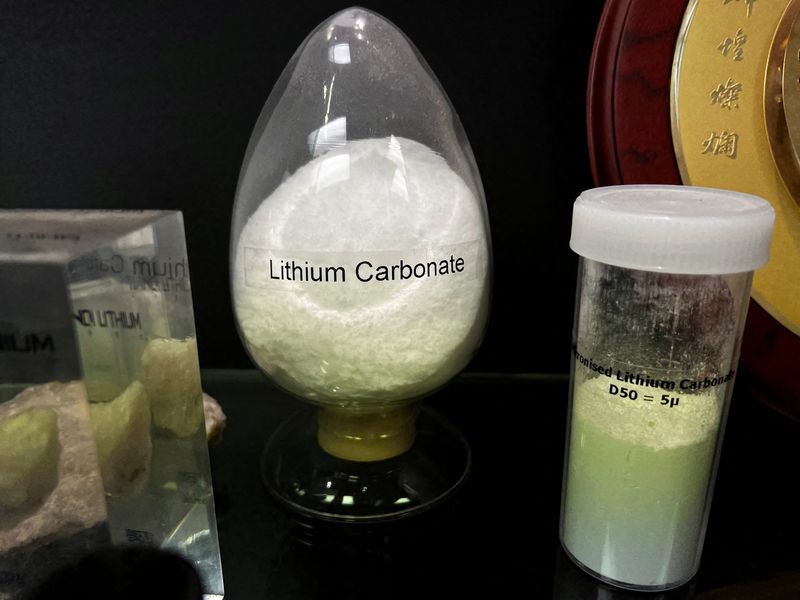By Ernest Scheyder
LITTLE ROCK, Arkansas (Reuters) -Standard Lithium is getting a boost from Washington as it vies with Exxon Mobil to become the first company to produce lithium in Arkansas, a U.S. state containing one of North America’s largest supplies of the battery metal.
The vote of confidence by multiple parts of the U.S. government is one of Washington’s strongest yet for any lithium project and shows increasing comfort with the still-unproven direct lithium extraction (DLE) industry.
U.S. senators, the Department of Energy and federal permitting officials have backed Standard this year. U.S. allies are considering providing debt financing.
Standard had been working to develop its DLE project for more than seven years, but Exxon in 2023 made a splash with a $100 million investment into Arkansas with aims to be a dominant player.
Lithium prices have been weak in recent months and Exxon has now delayed its lithium plans by at least a year. Standard has also gone slowly, but still aims to push the project forward on its 30,000 Arkansas acres, with first production slated for 2028.
Standard’s fortunes have turned since 2022 when its shares were targeted by a short-seller who claimed its DLE process was faulty, a claim the company rejected but one that dragged on its shares nearly 30% in one day.
The claims gained attention in part because no DLE technology had then or has since worked at commercial scale for any company, sparking investor angst across the industry.
Standard responded by pivoting its DLE strategy. It now plans to extract lithium using a process developed by Koch Industries with a different type of adsorbent material. Koch became Standard’s largest shareholder, and the company hired new executives and took on Norwegian energy giant Equinor as partner for its $1.45 billion project.
“The fact that Standard has gone through multiple iterations (of its DLE technology) was actually a selling point for us,” said Allison Kennedy Thurmond of Equinor, which invested in Standard’s Arkansas project last year over California’s lithium-rich Salton Sea region.
Short seller positions in the stock have dropped by more than 50% since the 2022 report. Five Wall Street analysts now recommend buying Standard’s shares; none recommend selling, according to the LSEG data.
“We are definitely at a tipping point,” David Park, Standard’s CEO, told Reuters. “We very strongly believe that the DLE tech will work.”
In a letter last month, three U.S. senators described Vancouver-based Standard as having “the only proven direct lithium extraction (DLE) technology and operations team in the United States,” a strong assertion given the company’s multiple DLE rivals across the country.
“A resilient domestic lithium supply will shield our military from supply chain disruptions, geopolitical manipulation and other external threats,” three Republican senators – John Cornyn of Texas and John Boozman and Tom Cotton of Arkansas – wrote to U.S. Defense Secretary Pete Hegseth. President Donald Trump has ordered the Defense Department to rename itself the Department of War, a change that will require action by Congress.
The senators encouraged Hegseth to fund Standard via a Cold War-era law known as the Defense Production Act that can unlock government money for projects tied to national security.
“As with all congressional correspondence, the department will respond directly to the members,” a Pentagon official said in response to a request for comment.
PRODUCTION PLANS
Arkansas sits atop the Smackover, an underground geological formation stretching from Florida to Texas filled with salty brines containing more than 5 million metric tons of lithium, according to the U.S. Geological Survey. DLE is essential to removing that lithium.
In January, the Energy Department gave Standard a $225 million grant to help process lithium from the Smackover for batteries. The U.S. kept paying out the grant during the government shutdown, and the company meets weekly with department staff, said Park, adding that Washington has not asked that the funding be converted into equity, as it has with Lithium Americas.
“We couldn’t be more confident about the grant,” Park said.
The Energy Department did not respond to requests for comment. The grant requires the company to undertake a potentially lengthy federal permitting review process. In April, Trump put Standard on a fast-track permitting list to speed up that process.
“We can make sure that they stick to that timeline that we’ve set up (for Standard) and move it forward,” Emily Domenech, executive director of Trump’s Permitting Council, told Reuters.
Standard expects lithium prices to more than double from current depressed levels to an average price of $22,000 per metric ton over the life of the 20-year project. That price would provide plenty of profit for Standard, which expects its costs to be $5,924 per metric ton of lithium.
Koch’s lithium business was bought earlier this year by privately held Aquatech, which counts private equity fund Cerberus as a minority investor. Cerberus co-founder Steve Feinberg is U.S. deputy defense secretary and is not involved in Cerberus’ operations. Aquatech said it does not believe Feinberg’s role has aided any part of their operation, including with Standard.
Standard is in final talks with several banks and foreign governments about funding $1 billion in loans for the project, Park said, adding that a decision could come within weeks.
The government credit agencies Export Finance Norway, Korea Trade Insurance Corporation, and Japan’s Nippon Export and Investment Insurance all declined to comment. Korea and Japan are large cathode manufacturers and thus lithium buyers, and Equinor’s largest shareholder is Norway’s government.
Arkansas Governor Sarah Huckabee Sanders has thrown her support behind the nascent industry, including Standard.
“We feel comfortable with the (DLE) technology and how that’s moved forward,” said Sanders.
(Reporting by Ernest Scheyder; additional reporting by Nora Buli in Oslo, Seunggyu Lim in Seoul and Yuka Obayashi in Tokyo; editing by Veronica Brown and David Gregorio)



Leave a Comment
Your email address will not be published. Required fields are marked *